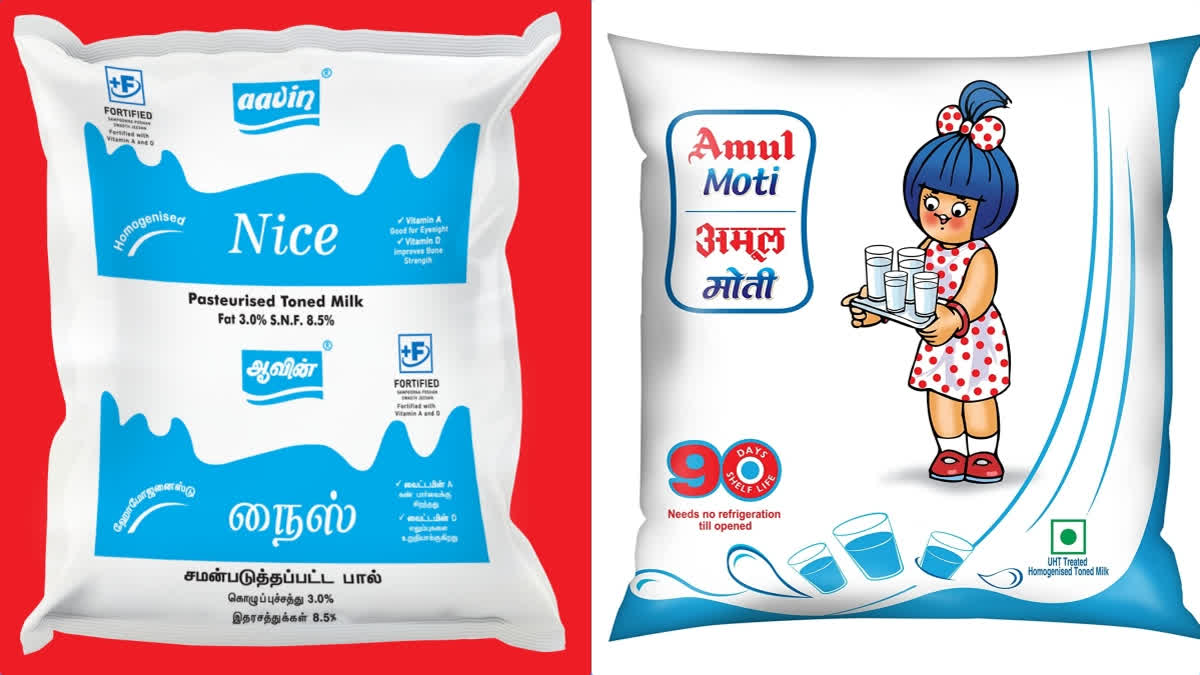Chennai: Scouting for new territories to expand its operations, especially milk procurement, Amul has set foot in Tamil Nadu, though not in a big way. After stiff resistance from Karnataka, it has emerged that the Gujarat Milk Marketing Federation (GCMMF), better known by its popular brand, Amul, has made its entry into Tamil Nadu.
This has created an alarm with a rising chorus to evict Amul from the state in its infancy itself well before it becomes a threat to Aavin, ending its monopoly. The entry of Amul comes at a time when Aavin was in the news for all the wrong reasons like frequent breaks in the supply chain and protests by milk suppliers for hike in procurement price, forcing Chief Minister Stalin to drop Dairy Development Minister SM Nazar, replacing him with Mano Thangaraj.
The new minister had assured to take steps to increase the quantum of procurement potential to 70 lakh litres per day (LLPD) from the current 40 LLPD. But, even this would not enable Aavin to corner 50% of the milk produced. With 9673 milk producers' cooperatives under its belt, spread across the state, Aavin procures only 35 LLPD from about 4.5 lakh members supplying milk.
It is only 16% of the state's milk production. Aavin assures a uniform remunerative price throughout the year. Members supplying milk receive Rs 32 to Rs 34 per litre. But, farmers complain that there is an inordinate delay in the timely disbursal of money and the procurement price is very low. Many milk cooperatives of Aavin keep the payment pending for over 90 days and the pending dues to farmers have gone up to Rs 600 crore. Also, the cattle feed supplied by Aavin is said to be of low quality. Farmers have complaints not only about Aavin but about private milk companies as well.
The above presents a fertile ground for other operators to step in and Amul has made it amply clear. For the present Amul has confined its operations to the backward rain shadow region of Krishnagiri and border areas of adjoining Dharmapuri districts of Tamil Nadu. “We do not poach Aavin supplier base. If anyone from Aavin approaches us, our response is a firm 'NO' since we are not working at cross purposes. Following a detailed survey, we have chosen Krishnagiri and established Self Help Groups, each consisting of not less than 15 members, and procure milk from them,” said an official of Amul, who preferred not to be named.
Also read: Amul vs Aavin in Tamil Nadu: Stalin tells Amit Shah to rein in Gujarat-dairy from procuring TN milk
“We purchase milk from Rs 32 to 36 per litre onwards. It might even go up to Rs 42, depending upon the quality. The monthly payment is disbursed to every supplier through their bank account on the tenth day of the month. If the tenth day falls on a Sunday, payment is made on Saturday itself. As of now, we procure 3500 to 4000 litres per day. We provide transportation from the collecting points to the chilling unit and it is the responsibility of the secretary of the SHG to ensure the milk collection is sent, he/she is our contact person,” he explained about Amul's functioning. Since Amul cannot form cooperative societies in the state, it circumvented it by forming SHGs.
On those who come to Amul, he said farmers who are supplying milk to private companies have come to them. “The reasons are many, but most importantly it is the delay in payment and reduction in rate per litre for some reason or the other as well as intermediaries. Feeling cheated, they opted for Amul,” he said, adding that at the moment there is no plan for expansion to other districts as it lay with the decision of the management.
To a question on the very high price of Amul's milk (Rs 66 per litre) compared to Aavin (Rs 44), the Amul official explained that Amul's is a premium product. While Stalin has written to Amit Shah, also Union Minister for Cooperation, expressing serious apprehension over Amul's expansion plans in the state, political parties have demanded that Aavin increase its quantum of procurement.
Tamil Nadu Milk Dealers/Employees Federation president SA Ponnusamy said Avin's entry could leave Aavin in the lurch since many farmers would migrate to Amul. “Avin's quantum of procurement, rather than getting increased, has come down from 40 LLPD to 30 LLPD in the last two years. Procurement rate too is kept the same since the ruling party is against hiking the retail sale price of milk,” he bemoaned, adding, “Reforms are long overdue in Aavin and the mess has to be cleared so that the pride of the state, Aavin, remains ahead of the competition.”
Also read: TN says no to 'dahi,' will only use 'tayir', says AAVIN over FSSAI directive



